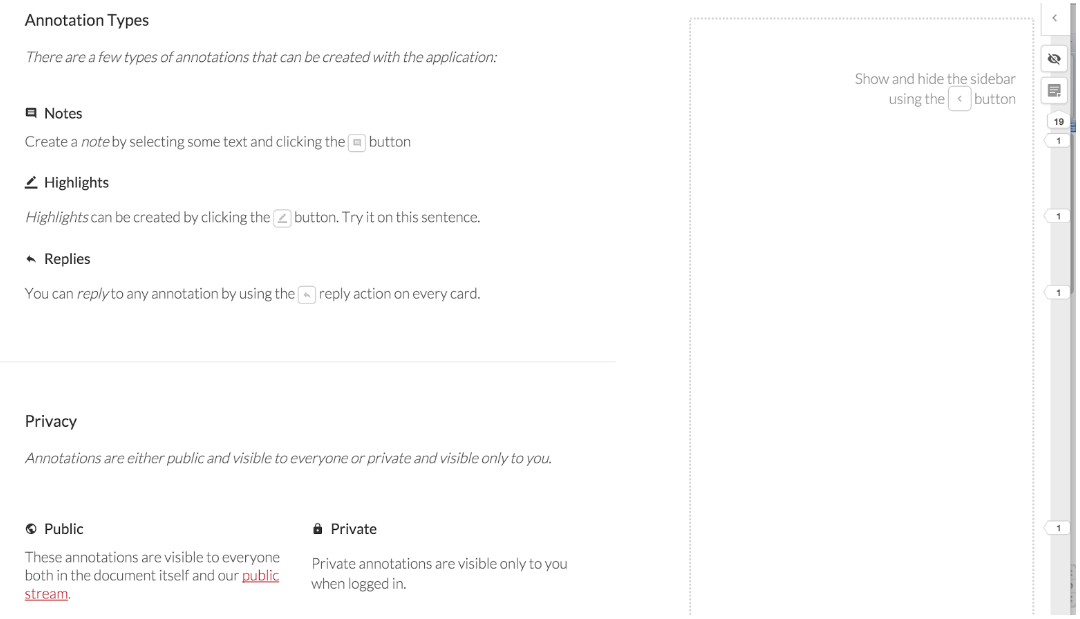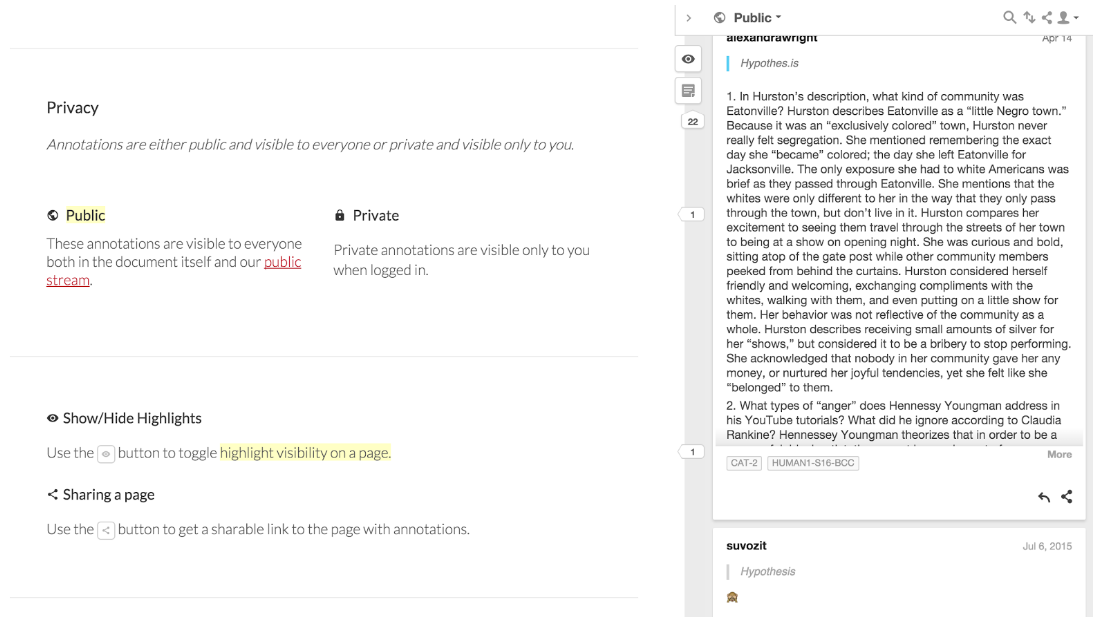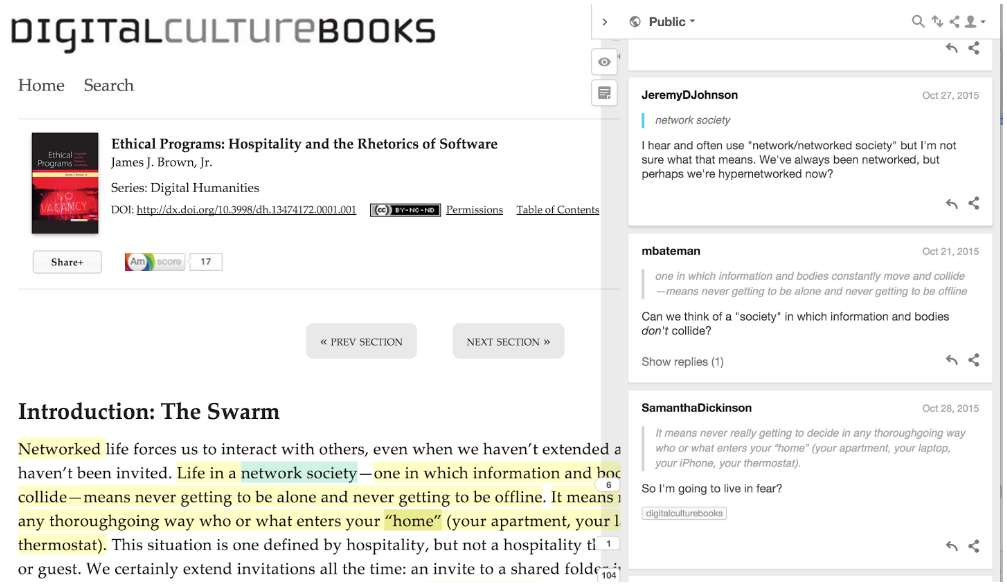Using Hypothes.is
To enable and structure the conversations around the content of this special ‘disrupted’ issue of the Journal of Media Practice, we are planning to use hypothes.is. Kris Schaffer (http://kris.shaffermusic.com/2016/04/hypothesis-public-research-notebook/) gives a useful summary of what hypothes.is is and does: ‘Hypothes.is is an open annotation tool for the web, allowing anyone to highlight, annotate, or comment on any webpage via a Chrome plugin (web developers can also install it on their sites, like I have with my blog). It’s similar to how Medium users can annotate and highlight blog posts on that platform, but you can use the hypothes.is plugin on any website. It’s important to note that hypothes.is users don’t alter the original website. Rather the hypothes.is plugin adds an annotation/highlighting layer over the webpage that only hypothes.is users can see, and hypothes.is users can toggle that annotation/highlighting layer on and off as they like.’
With the aid of hypothes.is we will thus create a comment or annotation layer over your various projects, binding them together to some extent, and enabling the disrupted JMP community to establish connections and to interact with specific aspects of your projects as they evolve. Hypothes.is is already used as a comment, annotation and conversation tool within various academic settings, for example to enable the collaborative annotation of James Brown’s book Ethical Programs: Hospitality and the Rhetorics of Software (University of Michigan Press, 2015).
To structure the various commentaries – and thus the conversations – across the disrupted JMP projects, we will be using tags or keywords to categorise the comments, questions and/or replies. We will create a live feed on the disrupted JMP platform that collects all the responses around the papers together using the tag or keyword disruptedjournal. Based on the submissions received, we have also structured the conversations around specific themes or topics of conversation. These are Performative Publishing; Practice-based Methodologies, Processual Research; Debating Media Practice Publishing; Multimodal research; and Politics and Economics. These themes will make it easier for people to identify the projects that are of interest to them, and will enable us to structure the conversations around certain topics more clearly. The conversations around these themes will similarly be structured around specific tags, which can be filtered out of the larger live feed to enable people to follow the conversation around specific themes of interest.
In order for this set-up to work smoothly, you can find some more detailed information underneath about how to use hypothes.is, and how to set up an account. You can also find some more information here on how to add tags to your comments and about how we will be using these (specific) tags or keywords to structure the conversations around the projects/papers.
Getting started with hypothes.is
Before you start annotating with hypothes.is, you will need to create an account, which you can do here: https://hypothes.is/register. You will find that you can interact with webpages and documents using hypothes.is in a variety of ways, via a Chrome plugin, by adding some code to your own webpage or by using a bookmarklet. For more about these options, please see here: https://hypothes.is/
Once you are all set-up, you can start annotating/leaving comments. For some basic instructions on how the hypothes.is interface works please see here (https://hypothes.is/docs/help) and the screenshots underneath.


We have also collected a few videos that show you how to use the interface underneath. Make sure to make your comments related to this special issue public (see picture above) to enable others to see your comments and for them to go into the live feed. You are of course free to make additional private annotations wherever you see fit.
Tags
As said before we will be using tags to structure the content into live feeds (see here and here). Please see the slideshow underneath to familiarise yourself with the use of tags when commenting/annotating. For this special issue we will be using specific tags to structure the content. Please make sure that you use the tag disruptedjournal for every comment that you place that relates to this special issue. Next to this general tag we will ask you to add additional tags based on the theme you are contributing to or responding to. These tags are:
performativepublishing, practicemethods, processualresearch, mediapracticepublishing, multimodalresearch, politicseconomics
So for example, if you are leaving a comment on a paper that deals with processual research, please make sure to add the tags disruptedjournal and processualresearch. This is a bit of additional work, but we hope this will become easier once we have all familiarised ourselves with this process (it remains very much an experiment for us too so please let us know if this is not working out for you).
If you have any more question related to this please use hypothes.is to the right to ask for questions or clarifications or alternatively use the regular comment section underneath this blog post.
